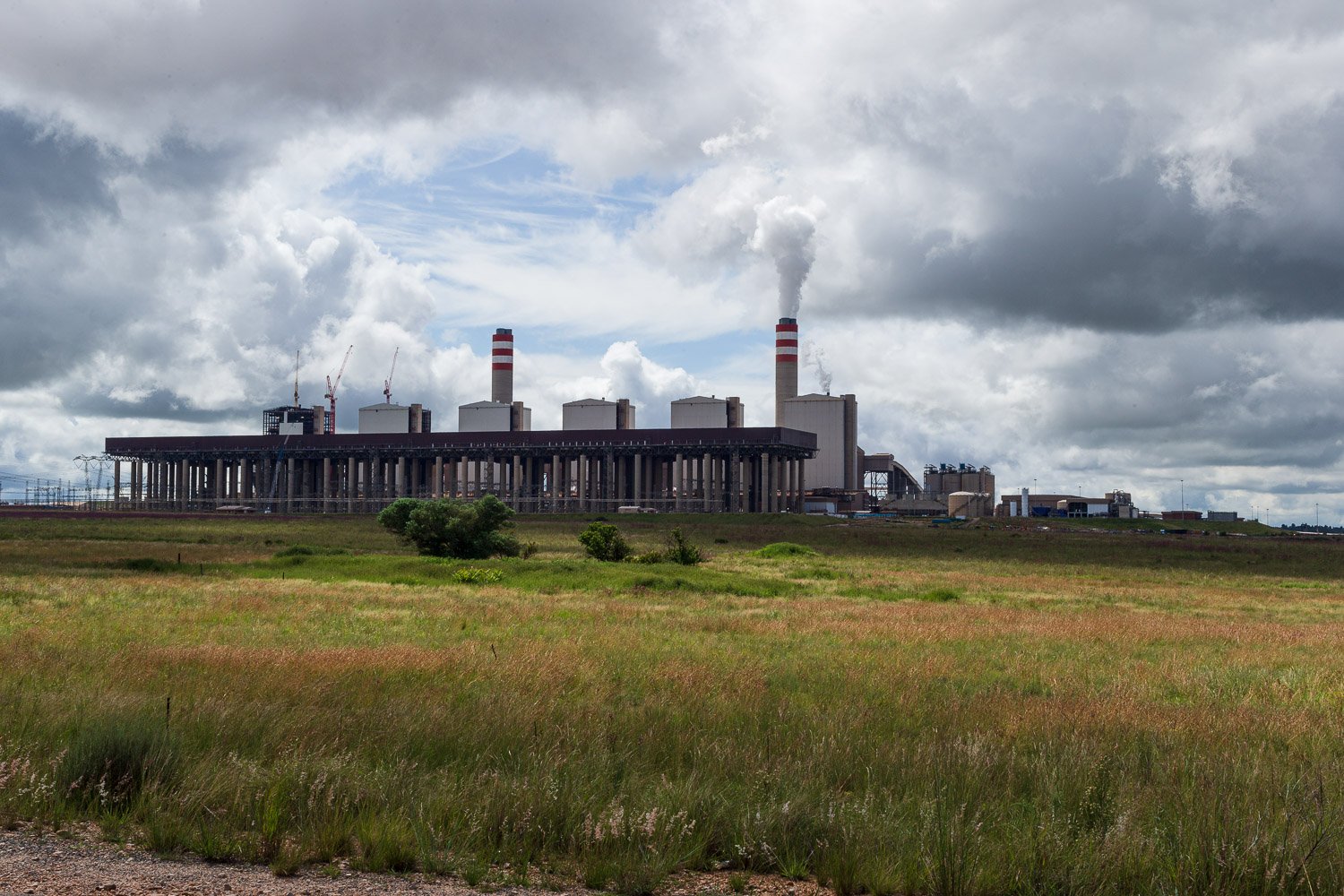
The Eskom Kendal Powerstation emits gases and coal dust into the environment. In total Eskom operates twelve coal-fired power stations in the Mpumalanga province. Across South Africa, the coal mines of the state-owned electricity monopoly, Eskom, burn around 120 million tons of coal a year, emitting some 200 billion liters of fluid gas.
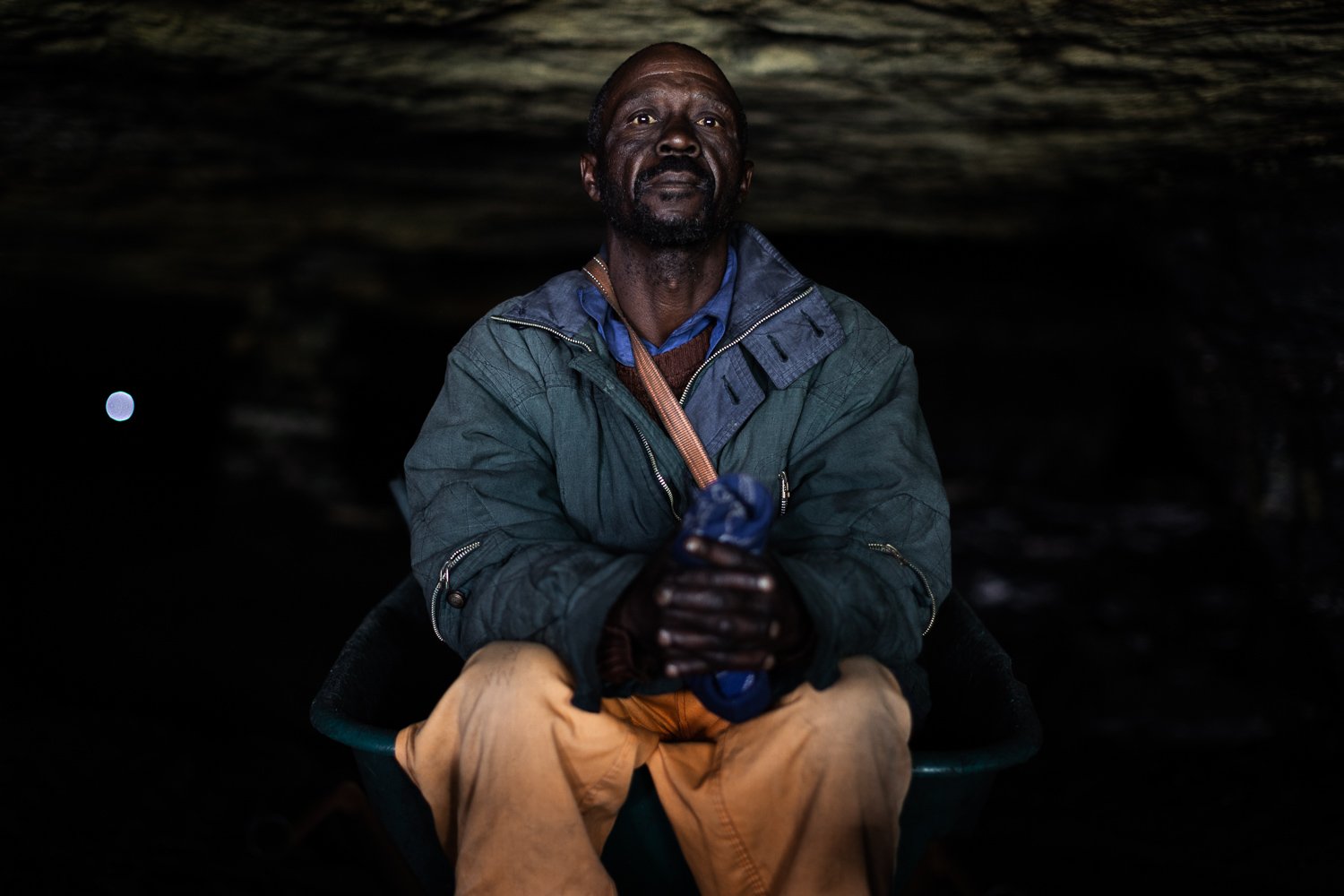
Mr Mabuza (61) sits on a wheelbarrow at the entrance of the Ting Dong coal mine shaft, the largest artisanal coal mine in Ermelo. Mr Mabuza and his business partner - the owner of the mine - were the first miners to start artificial mining in Ermelo in 2008. As a very knowledgeable and experienced miner he is the security manager in the Ting Dong mine and plans the day and night shifts of nearly one thousand Zama Zamas.
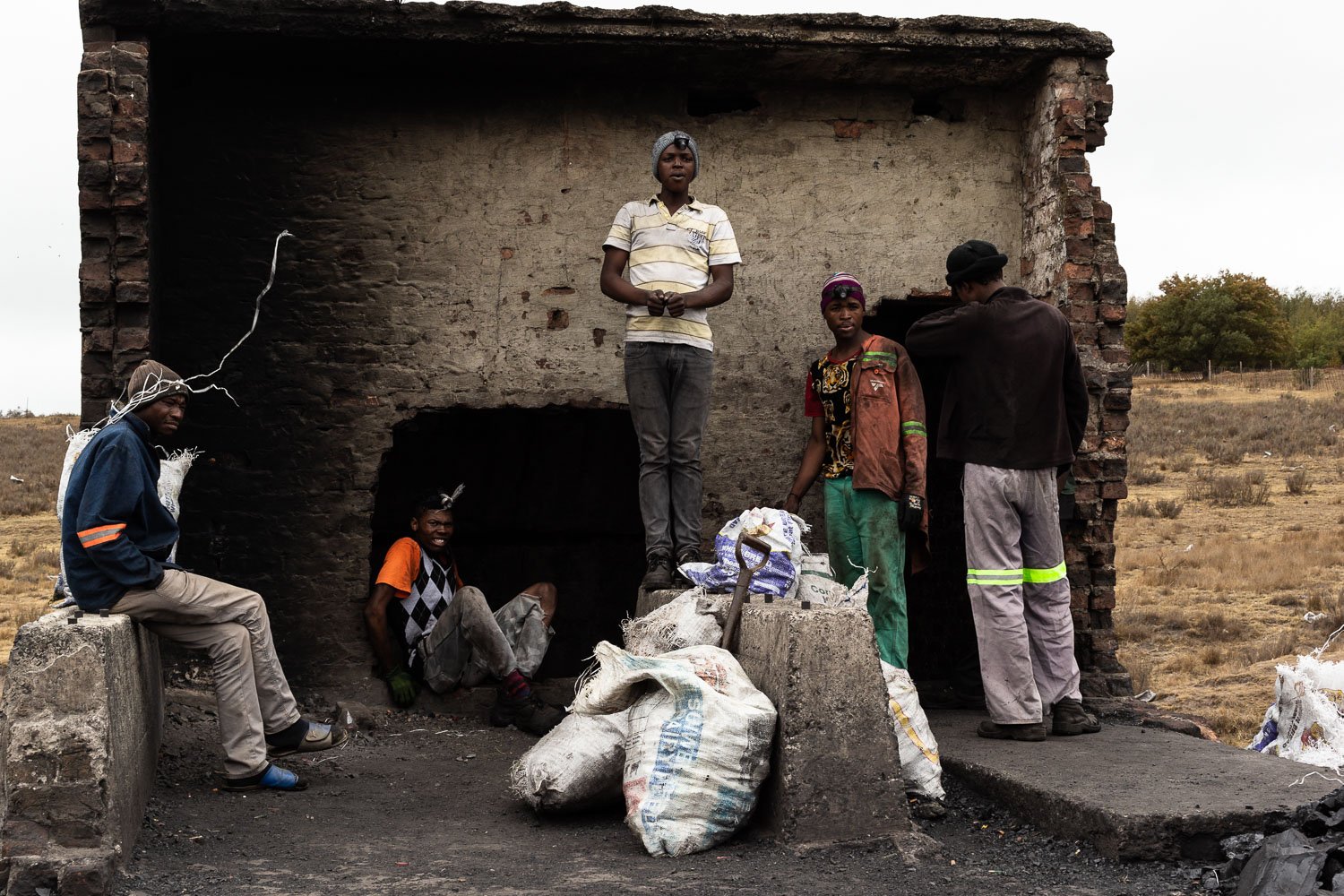
Small-scale miners, aged between 16 and 35 years, put food on the table while being in conflict with the law. Township communities do not benefit from coal, but are fully dependent on coal. People use coal to cook and to heat their homes because coal is more affordable than the expensive electricity sold by Eskom. For the Zama Zamas, 'illegal' mining in abandoned coal mines is the only way to create some profit from coal. Young men work up to ten hours per day, deep under the earth, and earn around R500/day. This is about three times higher than the average wage in the province. Corrupt politicans and ruthless business men promised progress and jobs, but all there exist are a new shopping mall, one casino, liquor stores, and fast food chains. Wages are as low as R20/hour, clean air and water have turned into poison, and unemployment rates are guessed to be as high as 70%.
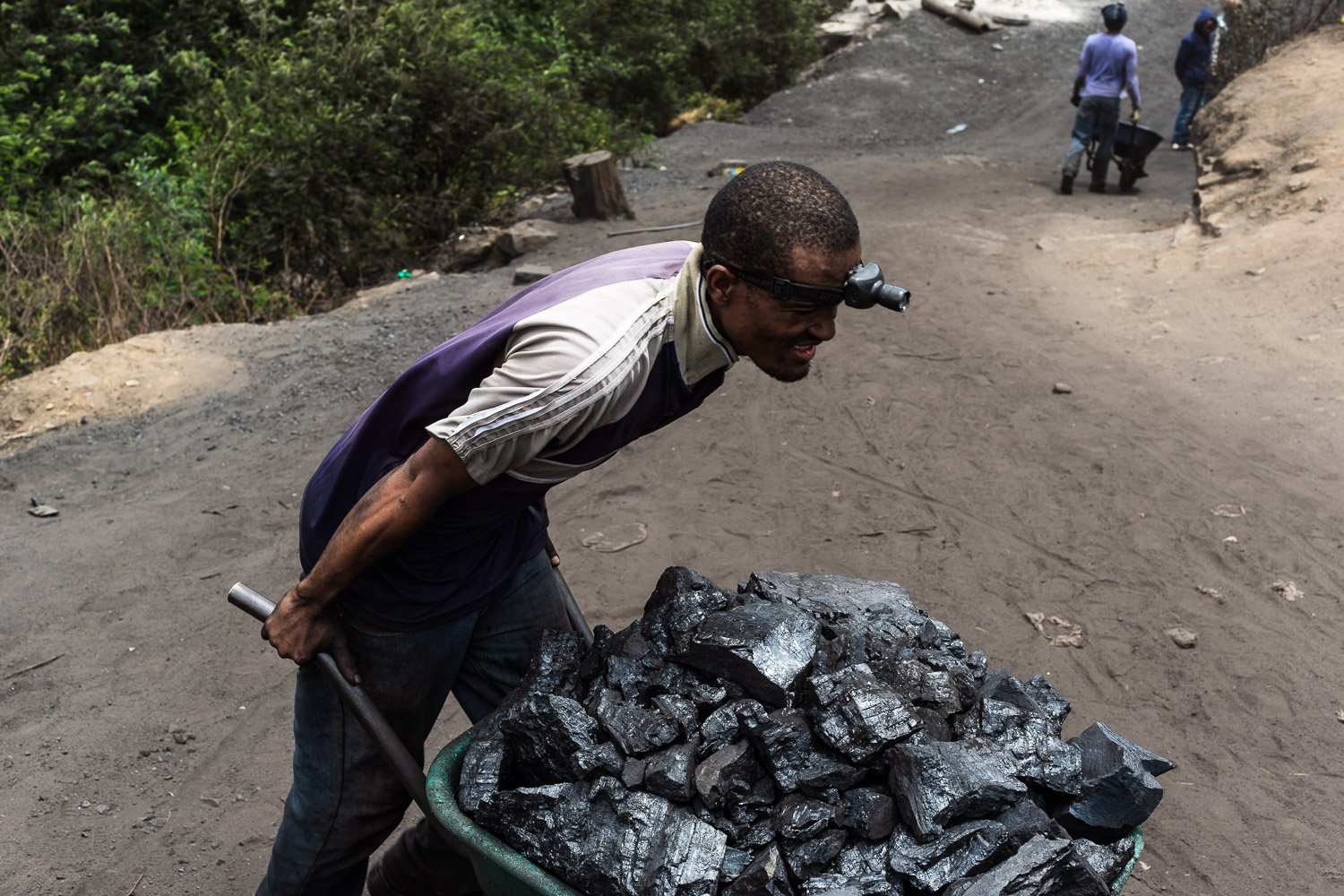
Small scale miners push coal from an abandoned coal mine shaft, and prepare it for sale in the townships.
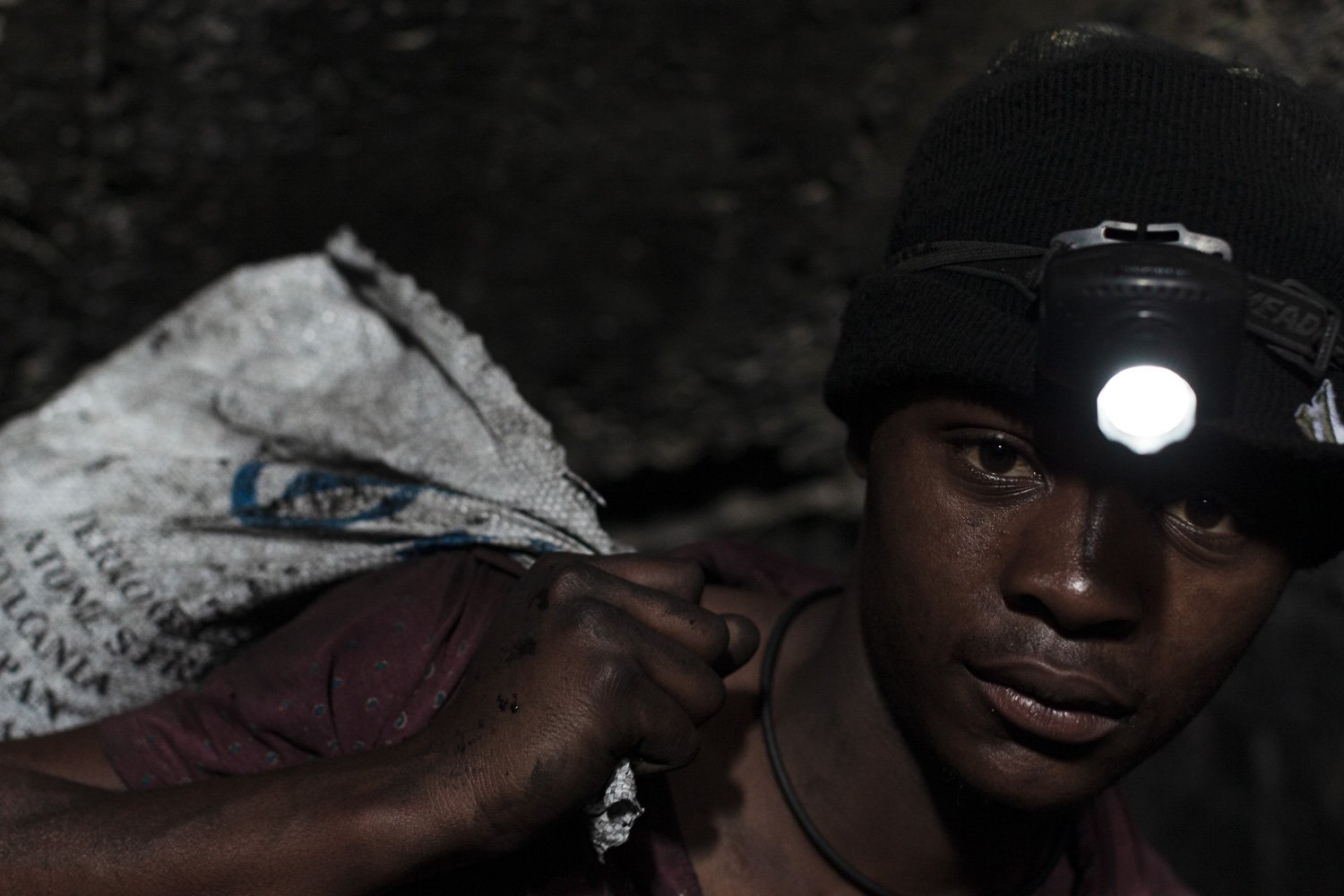
Mandla (17) carries a large sack filled with coal. One sack weights about 30kg to 40kg, and on a day he can carry up to 50 sacks from the mine shaft to the surface.
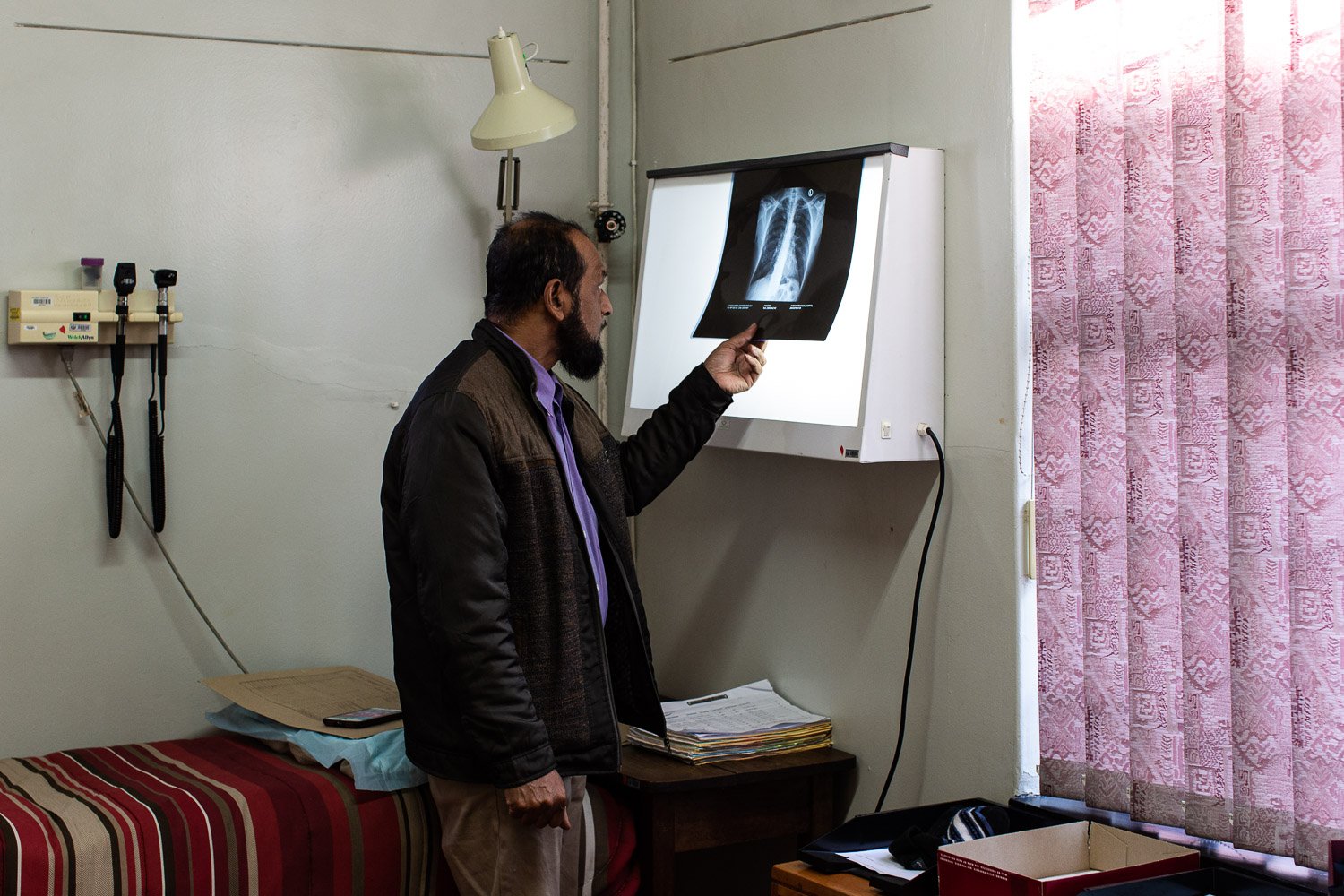
Doctor Khan (51), a senior specialist at the Witbank hospital, looks at an X-ray of a patient with a chronic heart and lung disease. He says that each year a higher number of patients comes to the hospital with critical respiratory diseases. He is very concerned that patients are unusually young, and he claims that the coal industry is causing these chronic diseases. Additionally the hospital struggles to operate because of a lack of water supply and qualified staff.
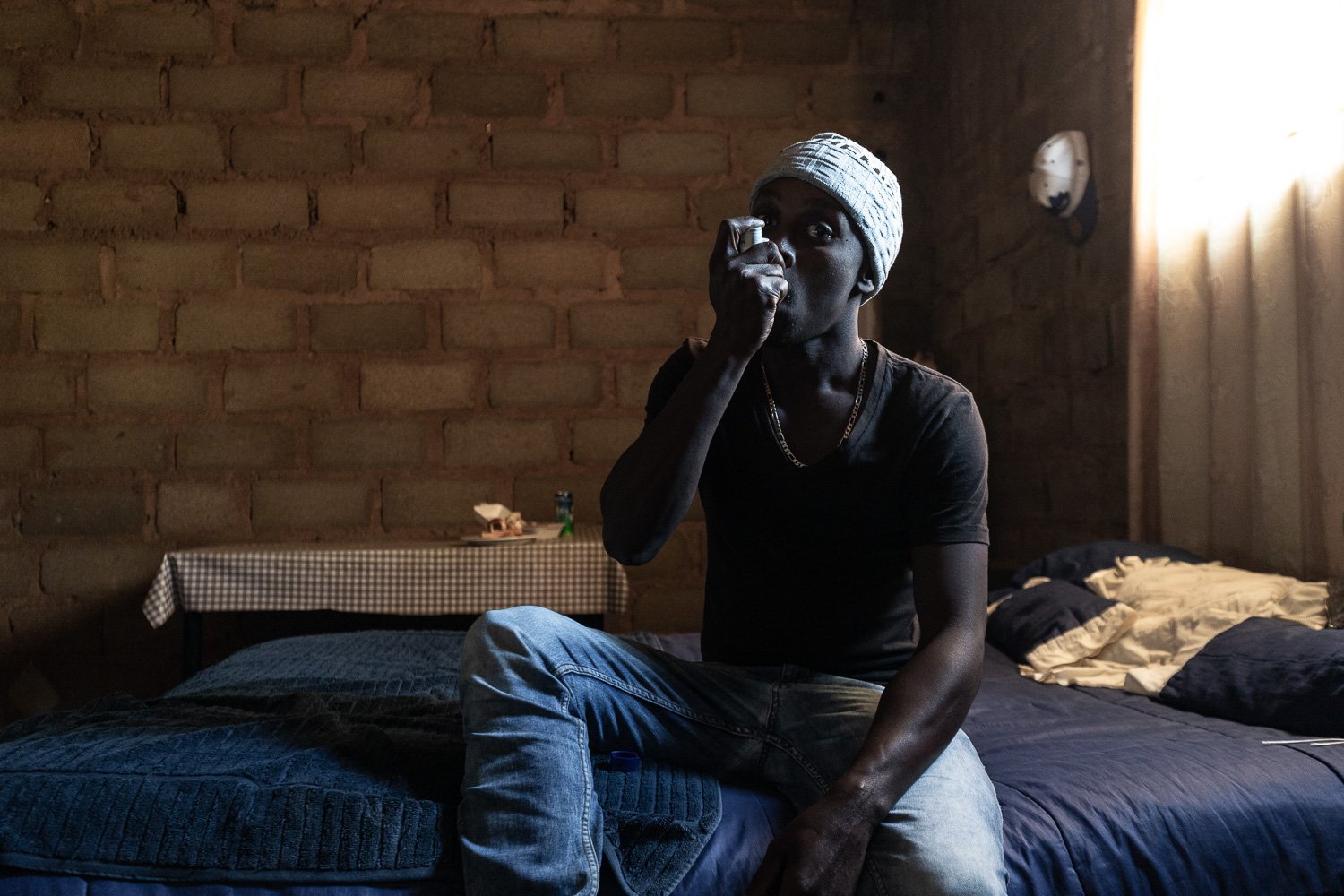
Lifa Mabilo (25) uses an asthma spray ever since he is five years old. He is unemployed and lives next to an open coal mine with his mother Promise (44), a well-known environmental activist, and his younger brother.
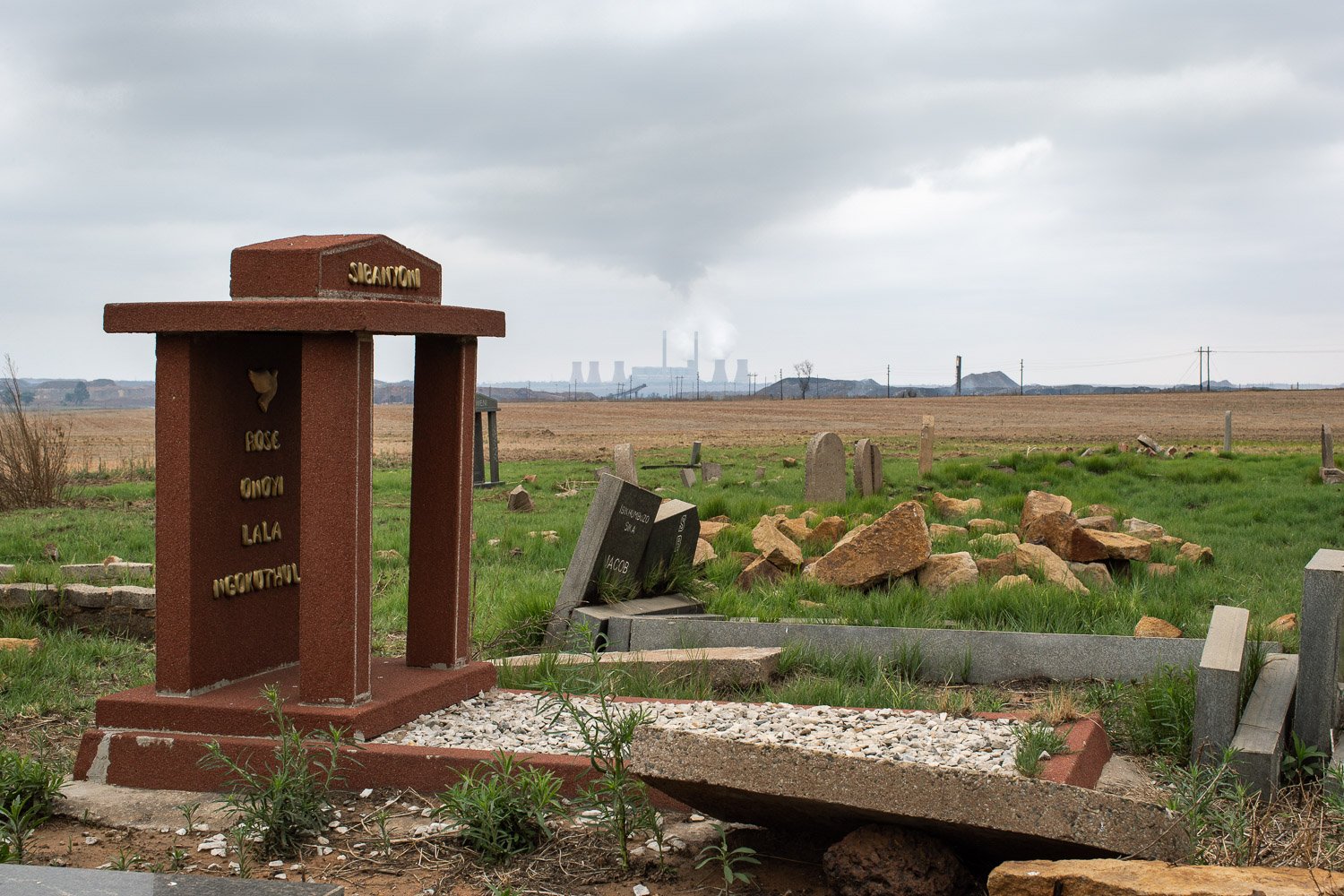
An abandoned cemetery in the periphery of an open coal mine and a coal-fired power station. On colder days the gas emissions ejected from coal-fired power stations, create a large and invisible toxic blanket that covers the entire environment and the population.
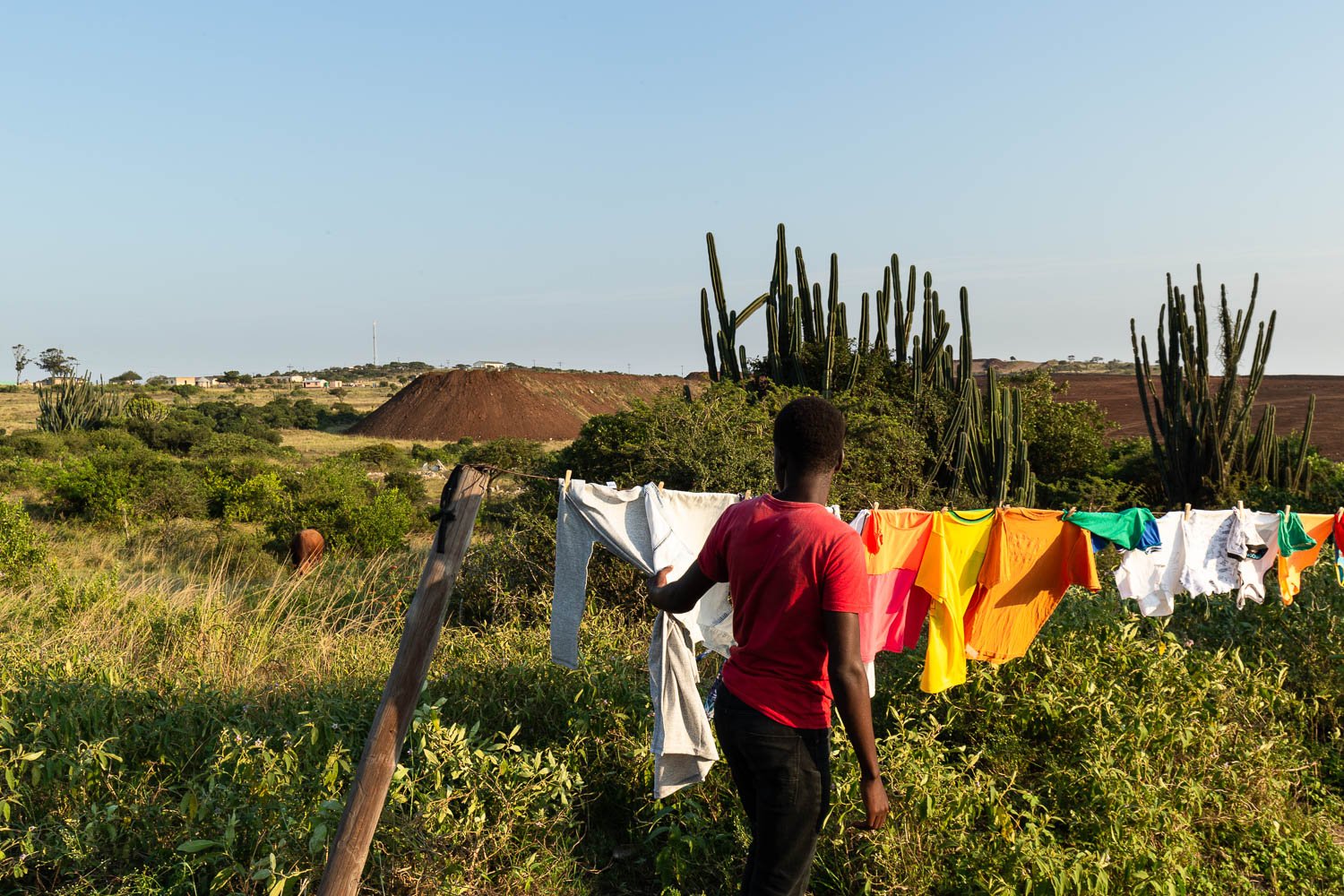
People's houses used to be surrounded by a lush and pristine nature. But coal companies and their mines move closer and closer to people's homes. Since the coal mine started to operate the resident's lives have been shattered and clean air and water have turned into poison. For twelve years families have been waiting for compensation from the coal mine or a fair offer for their land.
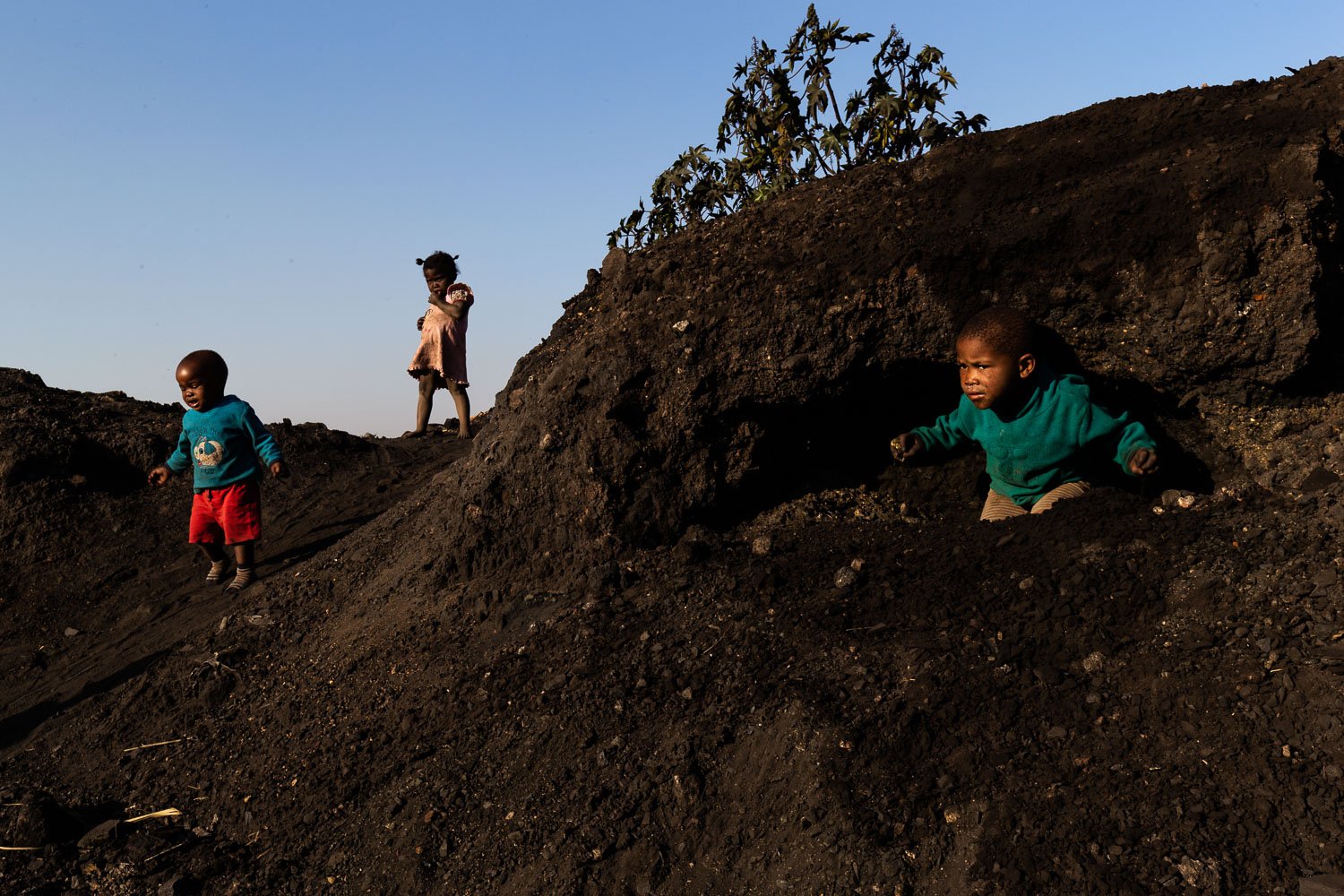
Children play in the midst of a toxic coal mine dump. Many of the youngest suffer from severe respiratory diseases.
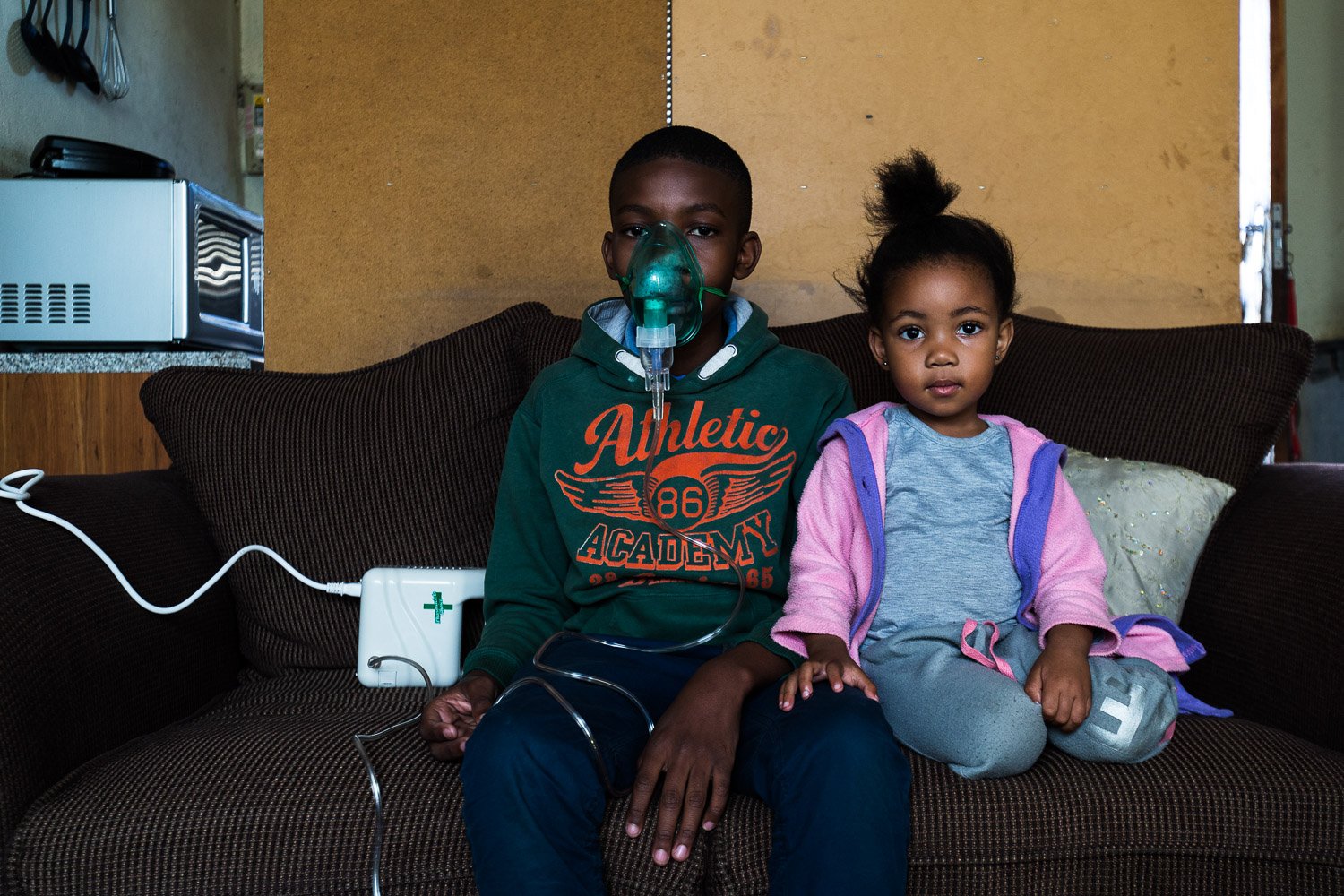
Shaun (13) sits with his sister (5) for a portrait and wears a compact nebuliser mask. He does not enjoy a normal life. Shaun suffers from chronic bronchitis since he is three years old. The toxic air, acrid fumes, and coal dust make it very difficult for Shaun to breathe. Years of heavy cigarette consumption would be the most common cause for such a lung desease, but for Shaun breathing-in polluted air is a signigficant factor for his ill health.
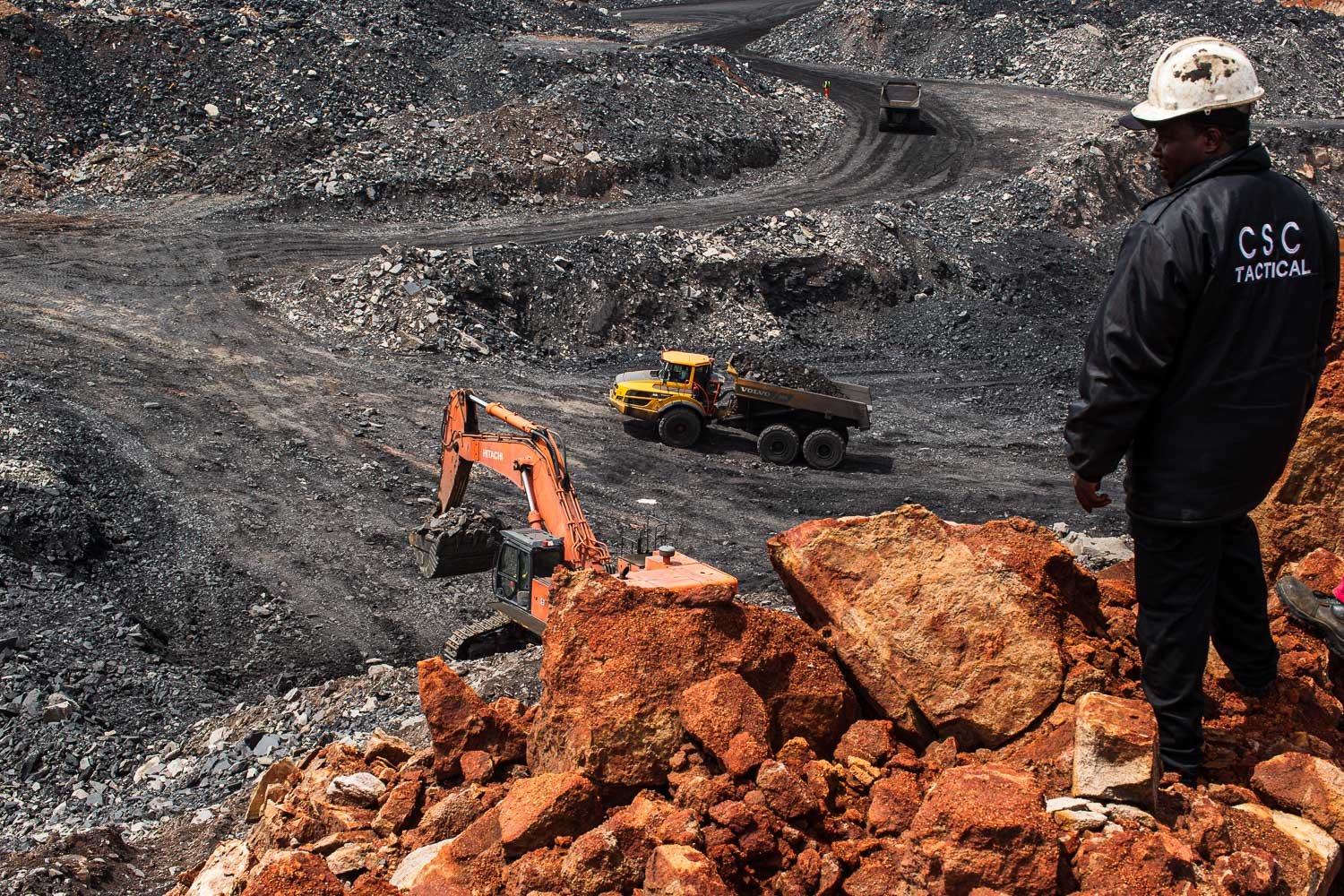
A worker oversees the Eyethu Coal mine, operated by Mooifontein. The mine is only meters away from the Duvha power station. There exist hundreds of large open coal mines and illegal coal mine dumps in the area. Heavy machines dig deep into the earth, which affects the ground water. Moreover, invisible toxic coal dust and acid mine water poison the entire evironment and the population. Health and economic costs on local communities are immense. Many residents in the Mpumalanga province suffer from irreversible respiratory diseases and premature deaths.
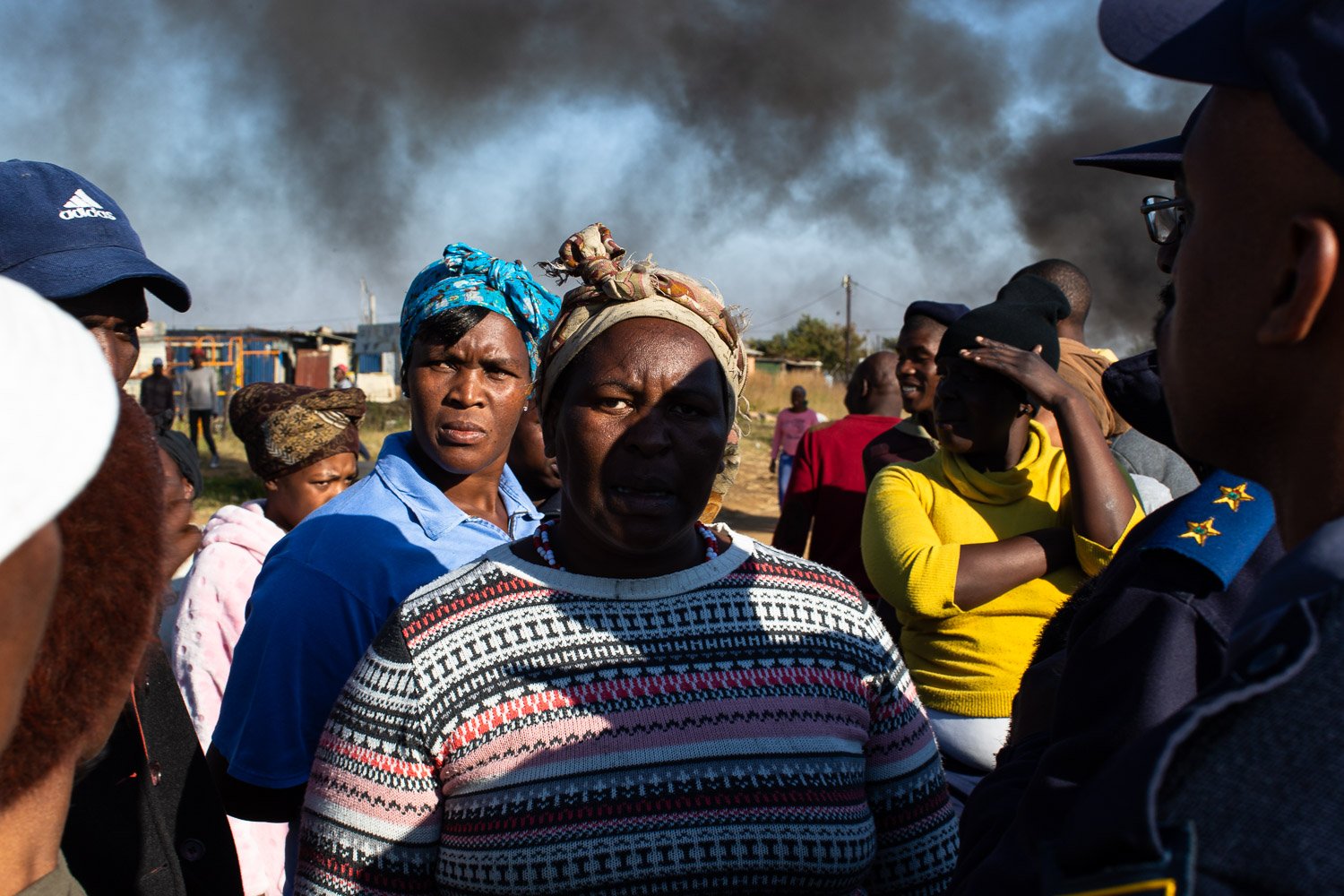
Members of the Kwazenzele Township community talk to the police about their ongoing protest. The community demands farming land and jobs, which the government has promised them. Since people were told that their community of over 3000 people will be relocated to make room for a new large open coal mine they have lost all hope. As a result they protest, burn tires to block the main motorway, and throw stones on cars that try to pass. The situation becomes more tense and unpredictable from day to day.
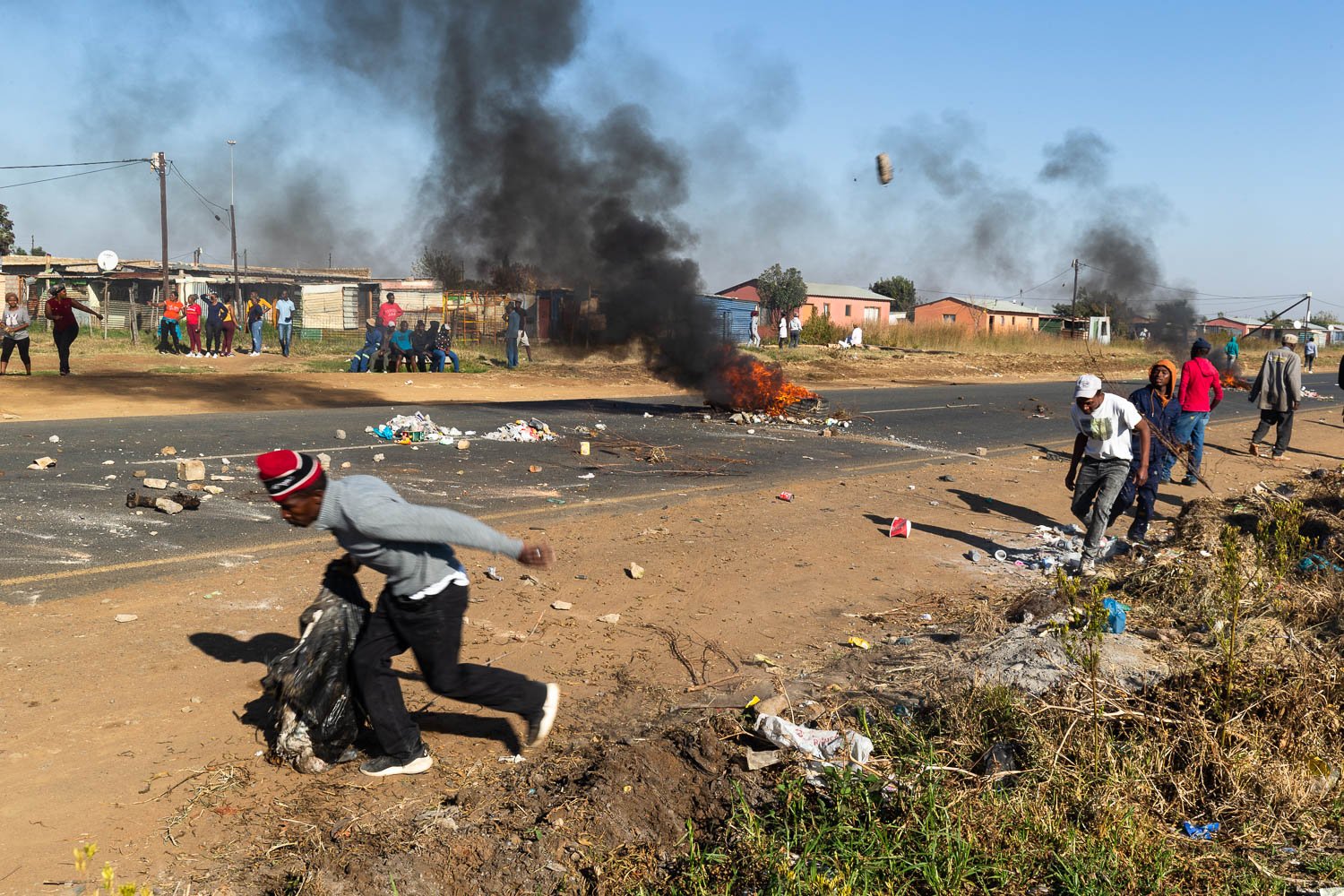
Residents of he Kwazenzele Township burn tires and throw stones to block the main motorway. Since they find out that their community of over 3000 people will be resettled to make room for a new large open coal mine they have lost all hope. Dangerous conflicts between supporters and opponents of the coal mine happen frequently.
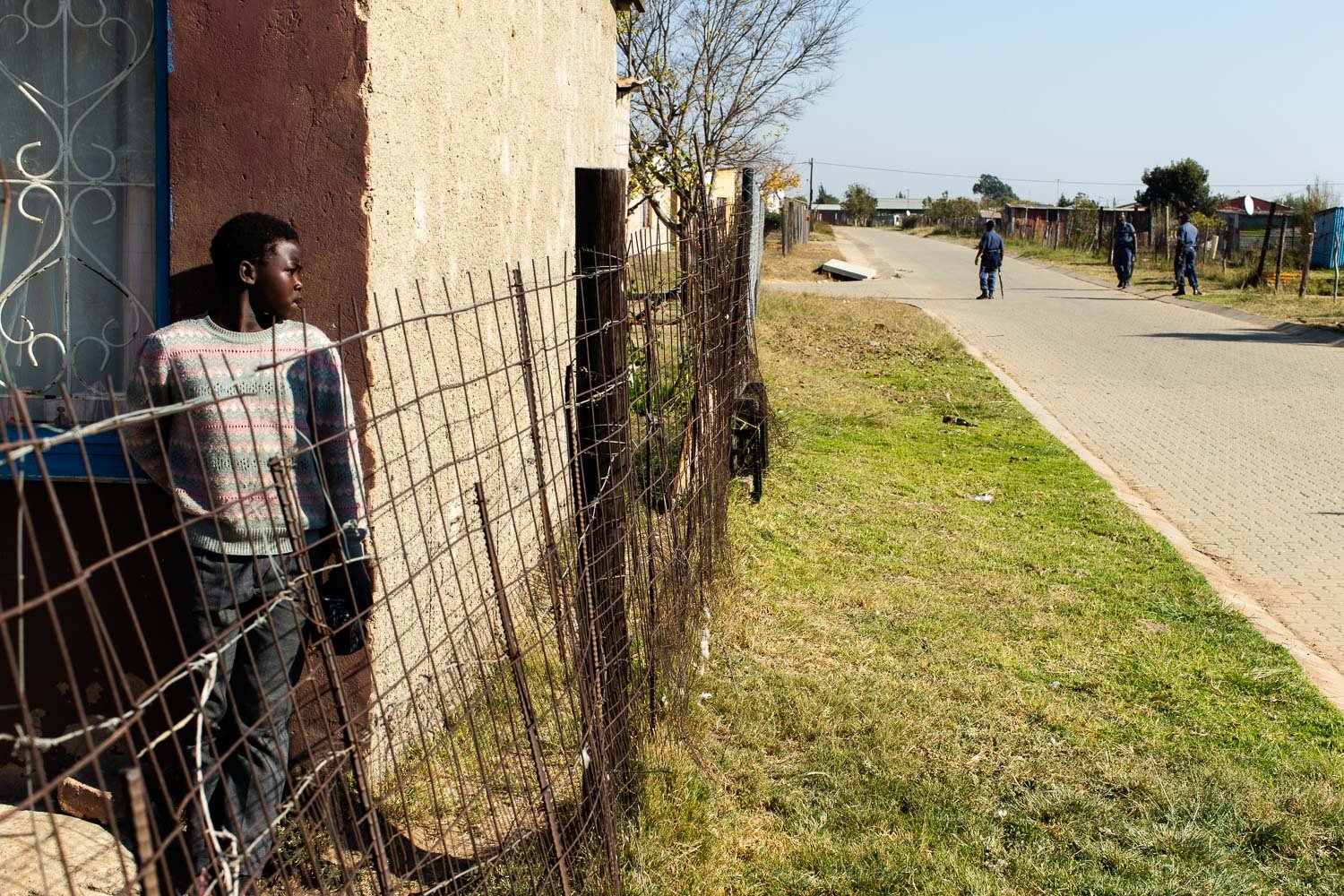
A scared boy is hiding from the police outside his house in the Kwazenzele Township - Springs.
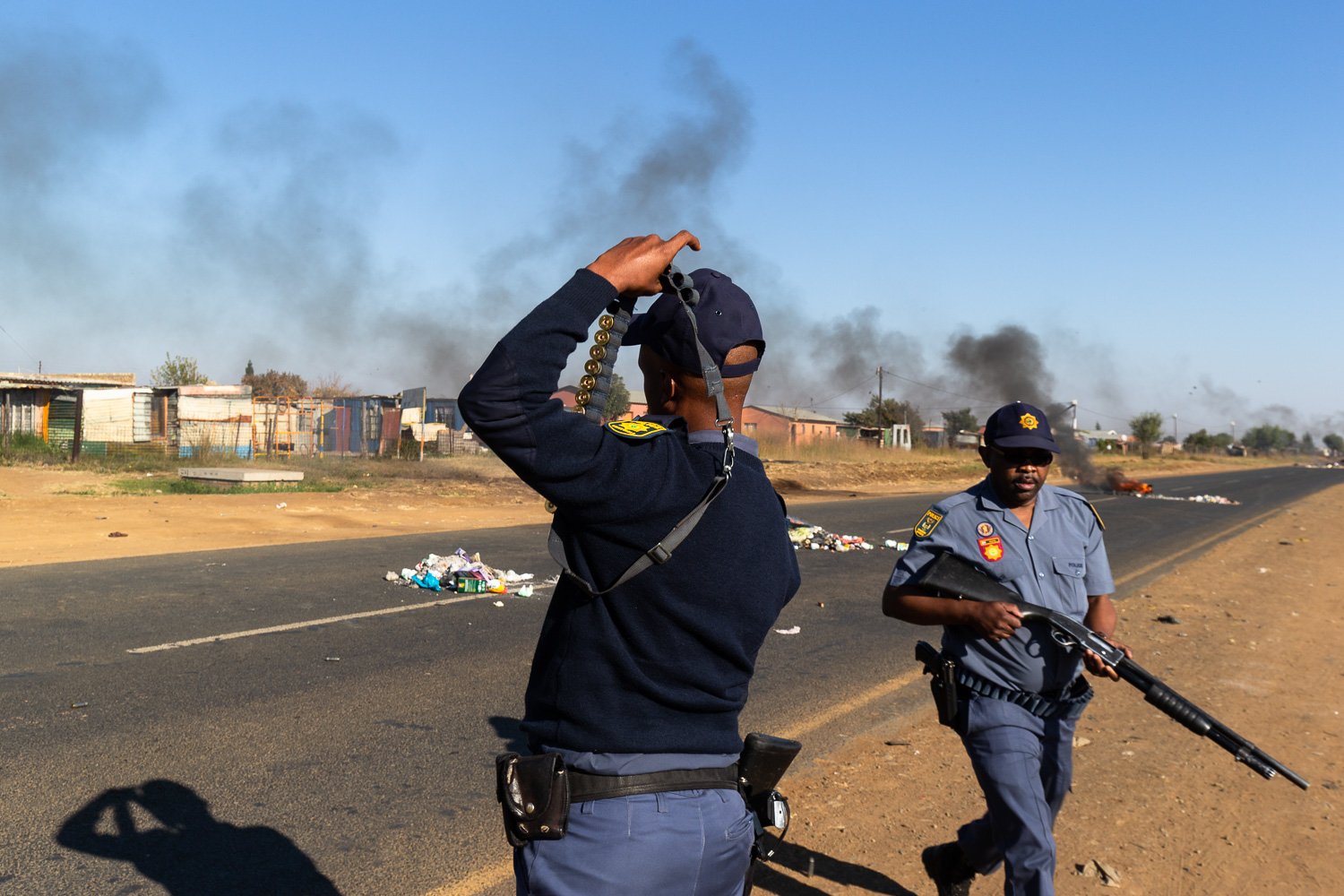
The police shoots rubber bullets at women and young men who protest against a planned open coal mine. If the new coal mine becomes reality then over 3000 people will lose their homes and will be relocated. Dangerous conflicts are caused by the coal industry and corrupt politics. The situation becomes more tense and unpredictable from day to day.
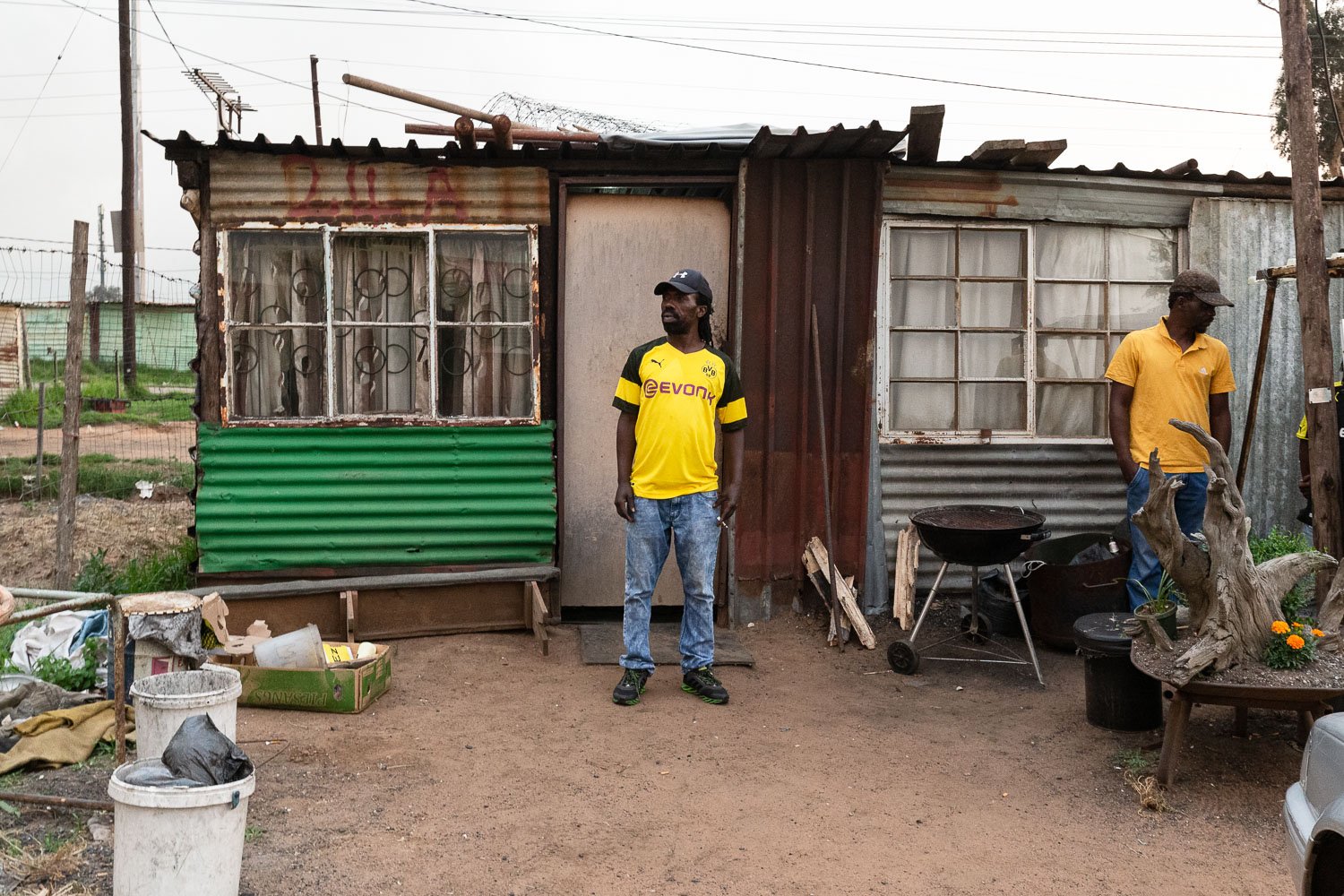
Philan Mngomezulu (45), the founder of the Khuthala Environmental Care Group, stands in front of his squatter house. His home doesn’t have running water or sanitation. Like millions of township residents Philan cooks and heats his home with coal.
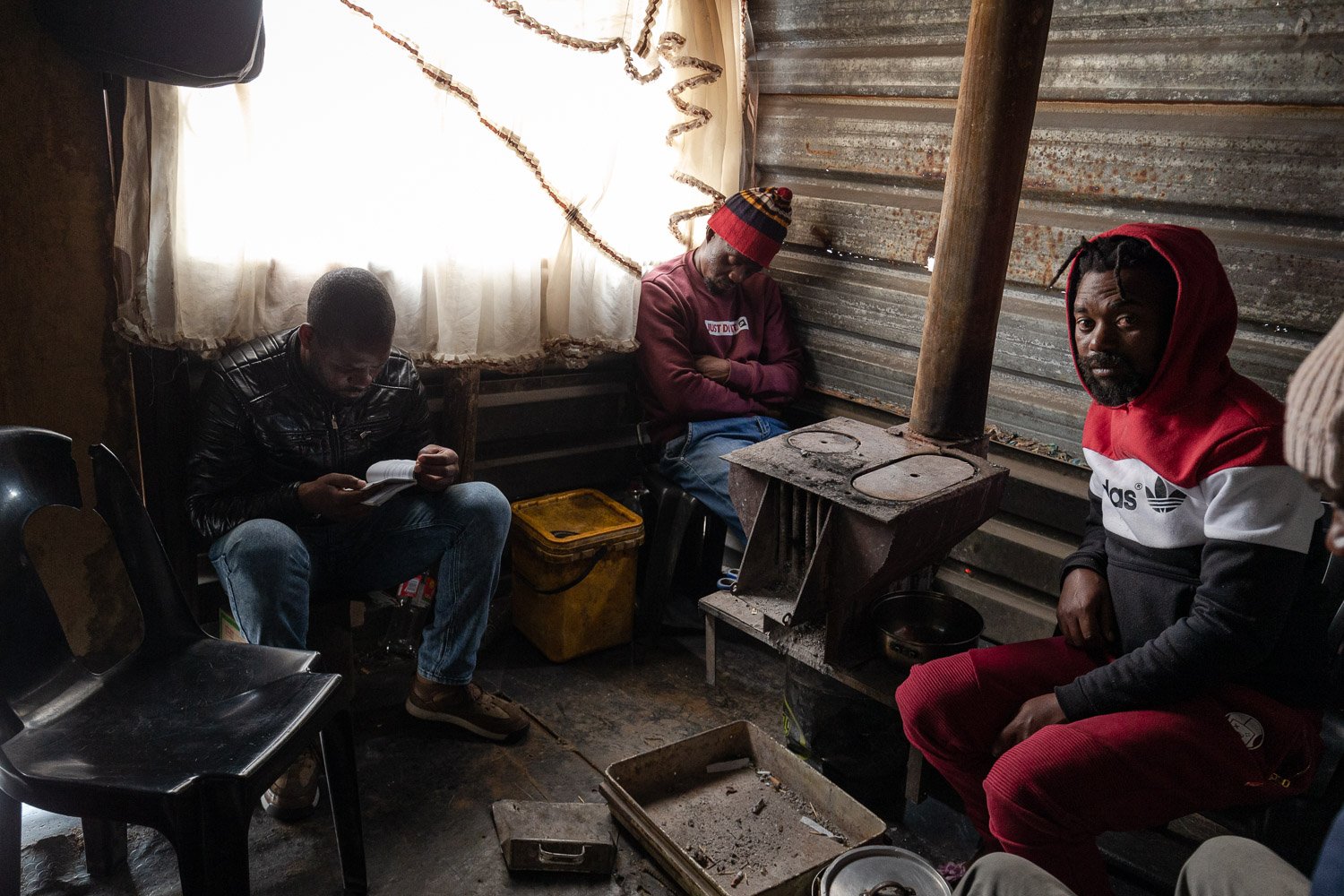
Members of the Khuthala Environmental Care Group meet at a friend’s house. They argue that the government has only given them empty promises and that they do not receive any support in their fight for a safer and clean environment. The group rehabilitates and cleans abandoned mines and waste-dumps, plans workshops for informal miners to educate them about the importance of climate change, creates vegetable gardening projects and supports unemployed people with food parcels and the creation of sustainable jobs outside the coal mining industry. Instead of waiting for governmental support the township community is taking matters in their own hands.
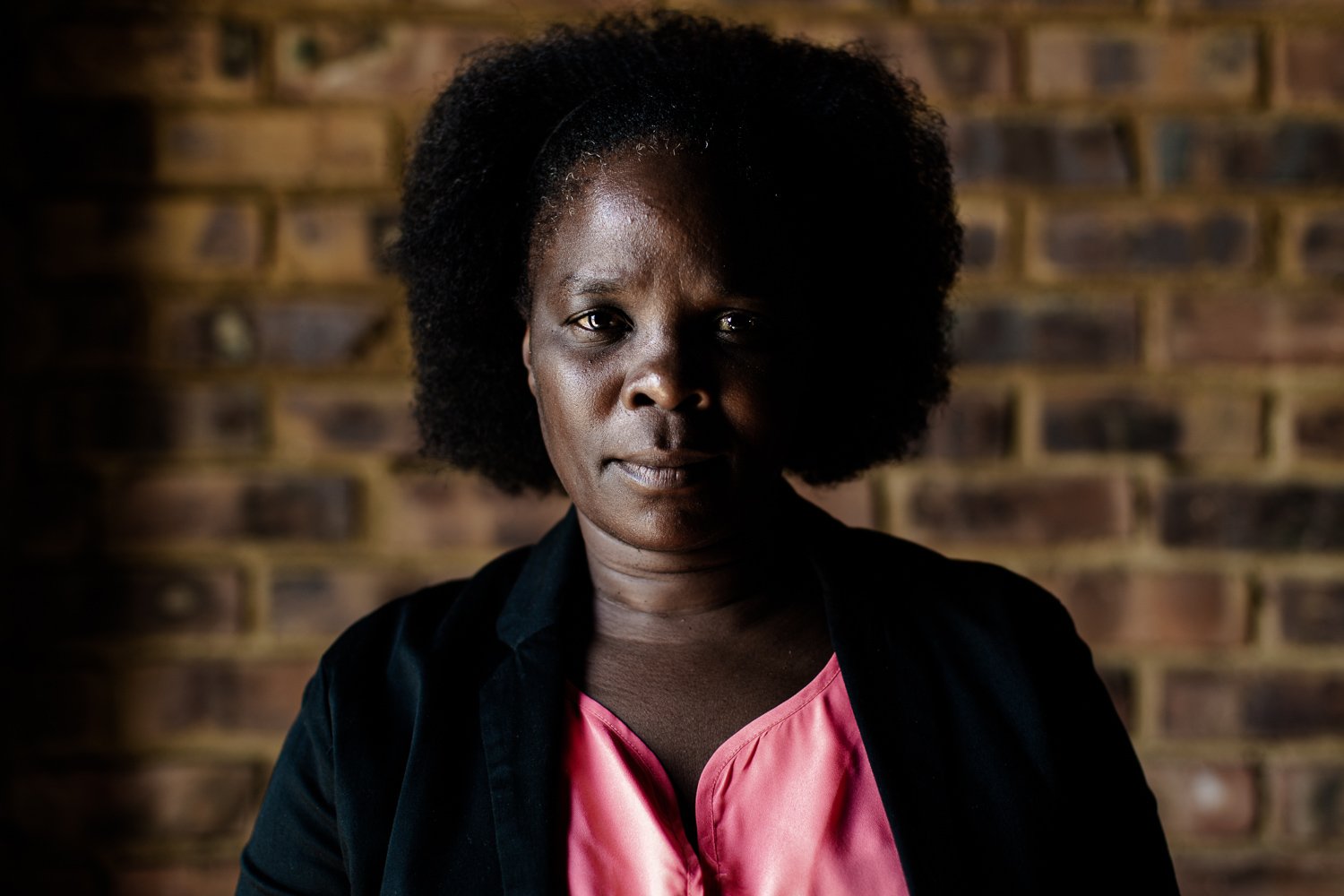
Promise Mabilo (44) is an activist and fights for a clean and safer environment. She says climate change is a global problem. But in South Africa nothing changes. Everything is becoming worse, and our parents and children are becoming sick. Her son Lifa suffers from asthma.
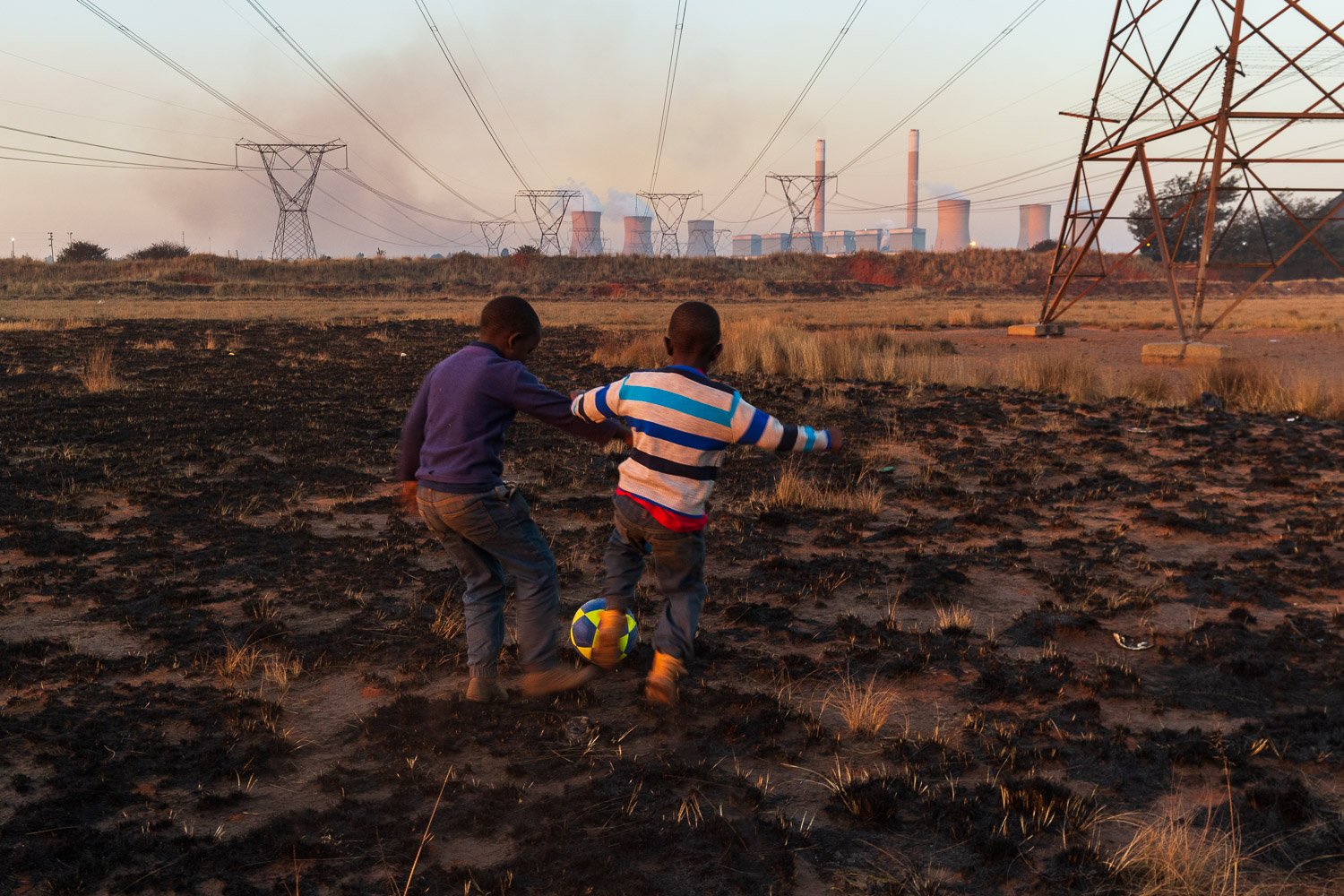
Two brothers, ten and seven years of age, play soccer next to the Duvha Powerstation (one of twelve coal fired power stations that are located in Witbank - Mpumalanga province). They live below large whirring electric power-cables without access to electricity or clean water. Acrid fumes, poisonous coal dust, acid rain, and contaminated water have horrendous and irreversible long-term effects on the population and the environment. Unsafe areas penetrated with sink holes, acid mine water drainage, mine blastings, and underground fires are neither marked or fenced.




















The Eskom Kendal Powerstation emits gases and coal dust into the environment. In total Eskom operates twelve coal-fired power stations in the Mpumalanga province. Across South Africa, the coal mines of the state-owned electricity monopoly, Eskom, burn around 120 million tons of coal a year, emitting some 200 billion liters of fluid gas.
Mr Mabuza (61) sits on a wheelbarrow at the entrance of the Ting Dong coal mine shaft, the largest artisanal coal mine in Ermelo. Mr Mabuza and his business partner - the owner of the mine - were the first miners to start artificial mining in Ermelo in 2008. As a very knowledgeable and experienced miner he is the security manager in the Ting Dong mine and plans the day and night shifts of nearly one thousand Zama Zamas.
Small-scale miners, aged between 16 and 35 years, put food on the table while being in conflict with the law. Township communities do not benefit from coal, but are fully dependent on coal. People use coal to cook and to heat their homes because coal is more affordable than the expensive electricity sold by Eskom. For the Zama Zamas, 'illegal' mining in abandoned coal mines is the only way to create some profit from coal. Young men work up to ten hours per day, deep under the earth, and earn around R500/day. This is about three times higher than the average wage in the province. Corrupt politicans and ruthless business men promised progress and jobs, but all there exist are a new shopping mall, one casino, liquor stores, and fast food chains. Wages are as low as R20/hour, clean air and water have turned into poison, and unemployment rates are guessed to be as high as 70%.
Small scale miners push coal from an abandoned coal mine shaft, and prepare it for sale in the townships.
Mandla (17) carries a large sack filled with coal. One sack weights about 30kg to 40kg, and on a day he can carry up to 50 sacks from the mine shaft to the surface.
Doctor Khan (51), a senior specialist at the Witbank hospital, looks at an X-ray of a patient with a chronic heart and lung disease. He says that each year a higher number of patients comes to the hospital with critical respiratory diseases. He is very concerned that patients are unusually young, and he claims that the coal industry is causing these chronic diseases. Additionally the hospital struggles to operate because of a lack of water supply and qualified staff.
Lifa Mabilo (25) uses an asthma spray ever since he is five years old. He is unemployed and lives next to an open coal mine with his mother Promise (44), a well-known environmental activist, and his younger brother.
An abandoned cemetery in the periphery of an open coal mine and a coal-fired power station. On colder days the gas emissions ejected from coal-fired power stations, create a large and invisible toxic blanket that covers the entire environment and the population.
People's houses used to be surrounded by a lush and pristine nature. But coal companies and their mines move closer and closer to people's homes. Since the coal mine started to operate the resident's lives have been shattered and clean air and water have turned into poison. For twelve years families have been waiting for compensation from the coal mine or a fair offer for their land.
Children play in the midst of a toxic coal mine dump. Many of the youngest suffer from severe respiratory diseases.
Shaun (13) sits with his sister (5) for a portrait and wears a compact nebuliser mask. He does not enjoy a normal life. Shaun suffers from chronic bronchitis since he is three years old. The toxic air, acrid fumes, and coal dust make it very difficult for Shaun to breathe. Years of heavy cigarette consumption would be the most common cause for such a lung desease, but for Shaun breathing-in polluted air is a signigficant factor for his ill health.
A worker oversees the Eyethu Coal mine, operated by Mooifontein. The mine is only meters away from the Duvha power station. There exist hundreds of large open coal mines and illegal coal mine dumps in the area. Heavy machines dig deep into the earth, which affects the ground water. Moreover, invisible toxic coal dust and acid mine water poison the entire evironment and the population. Health and economic costs on local communities are immense. Many residents in the Mpumalanga province suffer from irreversible respiratory diseases and premature deaths.
Members of the Kwazenzele Township community talk to the police about their ongoing protest. The community demands farming land and jobs, which the government has promised them. Since people were told that their community of over 3000 people will be relocated to make room for a new large open coal mine they have lost all hope. As a result they protest, burn tires to block the main motorway, and throw stones on cars that try to pass. The situation becomes more tense and unpredictable from day to day.
Residents of he Kwazenzele Township burn tires and throw stones to block the main motorway. Since they find out that their community of over 3000 people will be resettled to make room for a new large open coal mine they have lost all hope. Dangerous conflicts between supporters and opponents of the coal mine happen frequently.
A scared boy is hiding from the police outside his house in the Kwazenzele Township - Springs.
The police shoots rubber bullets at women and young men who protest against a planned open coal mine. If the new coal mine becomes reality then over 3000 people will lose their homes and will be relocated. Dangerous conflicts are caused by the coal industry and corrupt politics. The situation becomes more tense and unpredictable from day to day.
Philan Mngomezulu (45), the founder of the Khuthala Environmental Care Group, stands in front of his squatter house. His home doesn’t have running water or sanitation. Like millions of township residents Philan cooks and heats his home with coal.
Members of the Khuthala Environmental Care Group meet at a friend’s house. They argue that the government has only given them empty promises and that they do not receive any support in their fight for a safer and clean environment. The group rehabilitates and cleans abandoned mines and waste-dumps, plans workshops for informal miners to educate them about the importance of climate change, creates vegetable gardening projects and supports unemployed people with food parcels and the creation of sustainable jobs outside the coal mining industry. Instead of waiting for governmental support the township community is taking matters in their own hands.
Promise Mabilo (44) is an activist and fights for a clean and safer environment. She says climate change is a global problem. But in South Africa nothing changes. Everything is becoming worse, and our parents and children are becoming sick. Her son Lifa suffers from asthma.
Two brothers, ten and seven years of age, play soccer next to the Duvha Powerstation (one of twelve coal fired power stations that are located in Witbank - Mpumalanga province). They live below large whirring electric power-cables without access to electricity or clean water. Acrid fumes, poisonous coal dust, acid rain, and contaminated water have horrendous and irreversible long-term effects on the population and the environment. Unsafe areas penetrated with sink holes, acid mine water drainage, mine blastings, and underground fires are neither marked or fenced.